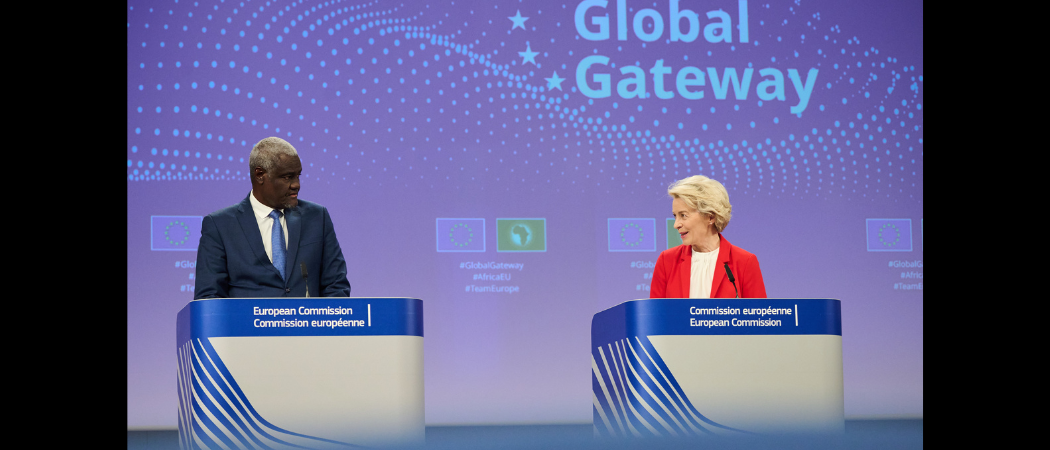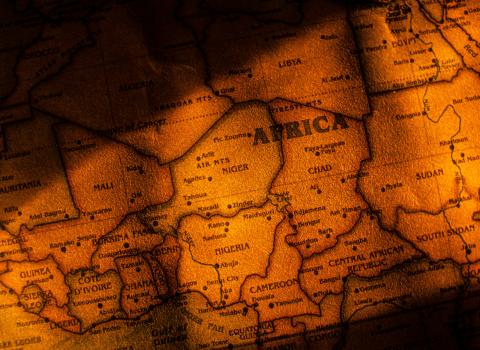The Commission looks to extend the Arise funding scheme for early career researchers in Africa, as France’s Research Institute for Development leads talks on a new research alliance

Moussa Faki Mahamat, chairperson of the African Union Commission, with European Commission President Ursula von der Leyen in 2022. Photo: Dati Bendo / European Union
Africa is fast becoming a key priority on the EU’s foreign policy agenda and research and innovation has a role to play in deepening the partnership – but investment and integrated strategies are needed to encourage more cooperation.
“We need a reinforced and deepened discussion between the Commission, member states and stakeholder organisations on how to establish framework conditions to ensure a sustainable partnership with our African partners,” said Patrick Nedellec, director for European and international cooperation at the French Ministry of Higher Education and Research, speaking at an event focused on R&I partnerships with Africa, organised by the French permanent representation to the EU.
This is one of three events focused on deepening cooperation with African partners taking place in Brussels this month, with Germany and Nordic universities holding their own discussions.
The ambition for strengthened cooperation is part of the EU’s global agenda. Research is one of the 11 priority areas of the Global Gateway, Ursula von der Leyen Commission's €250 billion project investing in infrastructure and development projects in regions ranging from Latin America and the Caribbean, to Sub-Saharan Africa.
When it comes African research cooperation, the political will is there, with the EU and the African Union signing a joint innovation agenda earlier this summer, promising to accelerate talent circulation, develop research infrastructures and foster the emergence of joint centres of excellence.
But this is only the beginning. There’s a need for further resources, better policy and integrated strategies to create the right framework for cooperation.
Lots of ideas are on the table. France’s Research Institute for Development (IRD) is currently in discussions with European research institutions on forming a new alliance for research and sustainable development – linking the efforts in different policies areas and levels.
“We believe that the proposal to create the European Research Alliance for Sustainable Development in the Global South is critical if we want to better link Horizon Europe research outputs with development policies and programmes supported by Global Europe,” said Gilles Pecassou, deputy director general at the IRD.
Cooperation with Africa is set to become increasingly pertinent as the talks on the next seven-year framework research programme, FP10, due to start in 2028, gather speed. A key debate will be around how European science can remain open to the world as the fight for strategic autonomy takes centre stage – including openness to strengthening ties with Africa.
"The debate on FP10 will be most probably very revealing on where we stand in real terms regarding Africa," said Erik Hansalek, head of unit for Africa at the Germany’s ministry for education and research. With EU budgets under pressure. “I would not be surprised to hear the question being raised rather prominently: what’s in for Europe when we cooperate with African provinces on R&I?” he said.
Arise project success
There are talks of new initiatives but cooperation hasn’t been standing still in the past few years. At the event on Wednesday, many highlighted the success of the African Research Initiative for Scientific Excellence (ARISE), an EU-funded pilot that provides European Research Council-style support for early career researchers in Africa.
Discussions on continuing the project beyond the pilot phase have gathered significant support. In early June, a group of around 2,000 European and African universities signed a call to extend the pilot to 2027, in addition to launching additional funding schemes for mid-career and senior researchers.
The Commission is trying to find a way. Earlier this week, the Commission held a meeting with the representatives of the African Academy of Sciences to discuss extending the programme, Hans Stausboll, director for Africa at the Commission directorate for international partnerships confirmed on Wednesday.
And there’s funding in Horizon Europe, EU’s €95.5 billion research and innovation programme, too. In the last three years, the Horizon Europe Africa Initiatives have covered 60 different topics in competitive calls for proposals with a budget of €650 million.
The topics include green, digital, health, innovation and capacity building. They were co-designed with stakeholders in Africa and have attracted significant interest, with organisations from more than 40 African countries participating.
But there’s still a long way to go to improve cooperation, and EU-level funding won’t suffice. Many speakers at the event pointed to EU member states’ reluctance to boost their efforts on R&I cooperation with Africa, with only a few countries doing the heavy lifting.
On the African side, a better policy mix, more resources and more efficient management structures are needed to give research a boost, said Olusola Bandele Oyewole, general director of the Association of African Universities.
Editor's note: A previous version of this story mistakenly credited Gilles Pecassou's quote to Olivier Dangles, deputy science director at the IRD, and said ARISE was funded by Horizon 2020 rather than the EU's Development Cooperation Instrument. The article was updated on 15 September.





 A unique international forum for public research organisations and companies to connect their external engagement with strategic interests around their R&D system.
A unique international forum for public research organisations and companies to connect their external engagement with strategic interests around their R&D system.